New owner of Suunto Race - first feelings
-
I used a belt to for all my exercises. For daily tracking, I rely on the watch’s sensor. It worked more or less correctly seated but as soon as the arm moves (walking, moving, etc…) the sensor panics and indicates false additional values and up to 120 bpm/m seated for more than one hour at my office. In the car, it’s the same. When driving, the sensor gives the correct value. As soon as I go out, he gets carried away. The app’s cardiac tracking line resembles a roller coaster. I put my wife’s Aw on the other wrist to check, it showed me between 52 and 55 sitting while the Race 110. I think it is a sensor generation problem ( too old compared to new sensors form apple, Garmin, coros, etc…) I even compared with a pace 2 and it gives the right values.
It’s a shame because otherwise, the watch is pretty and works well. Spending so much money to get additionally distorted monitoring is not normal. A simple update should not fix the problem since it is hardware related.
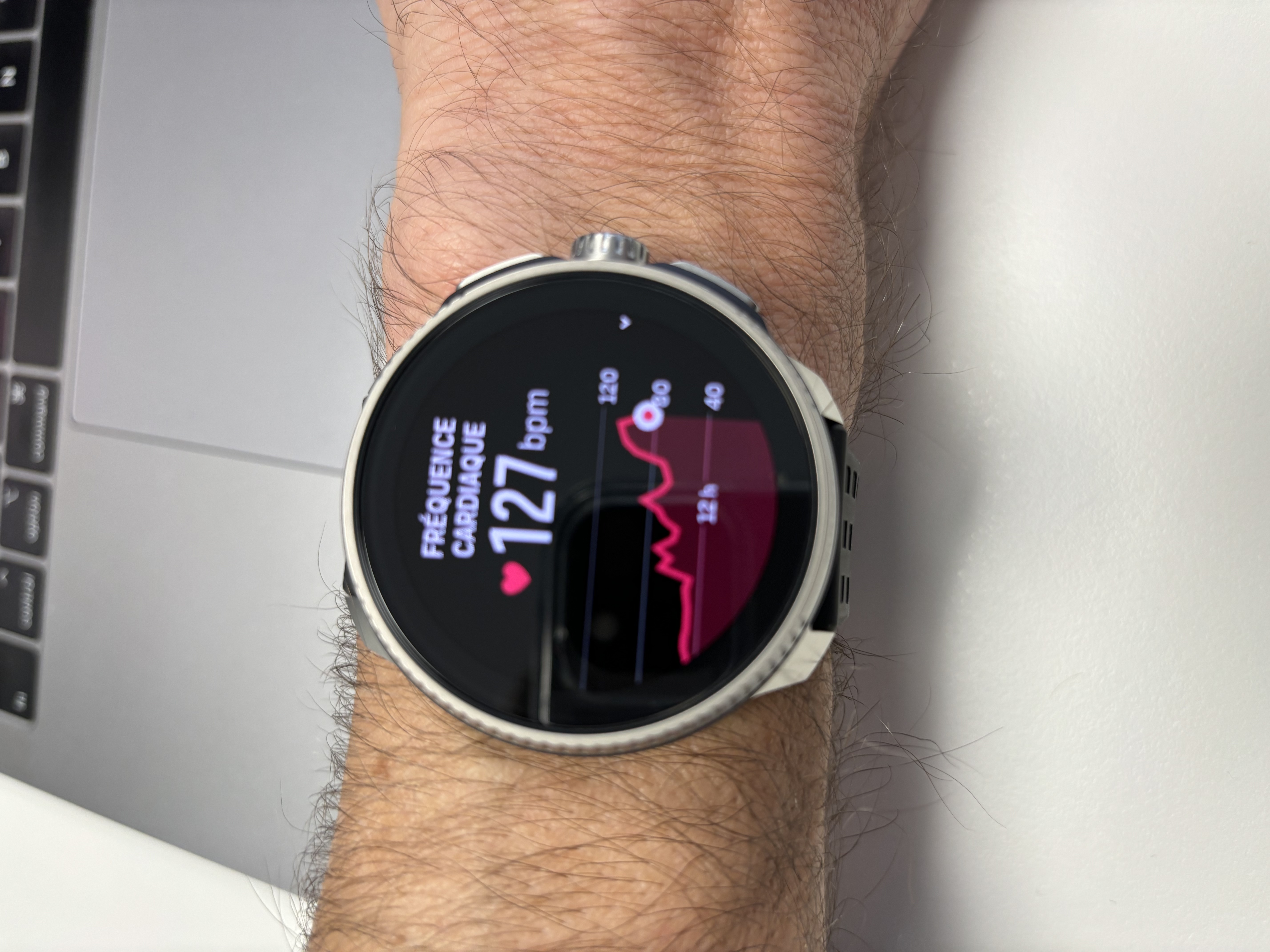
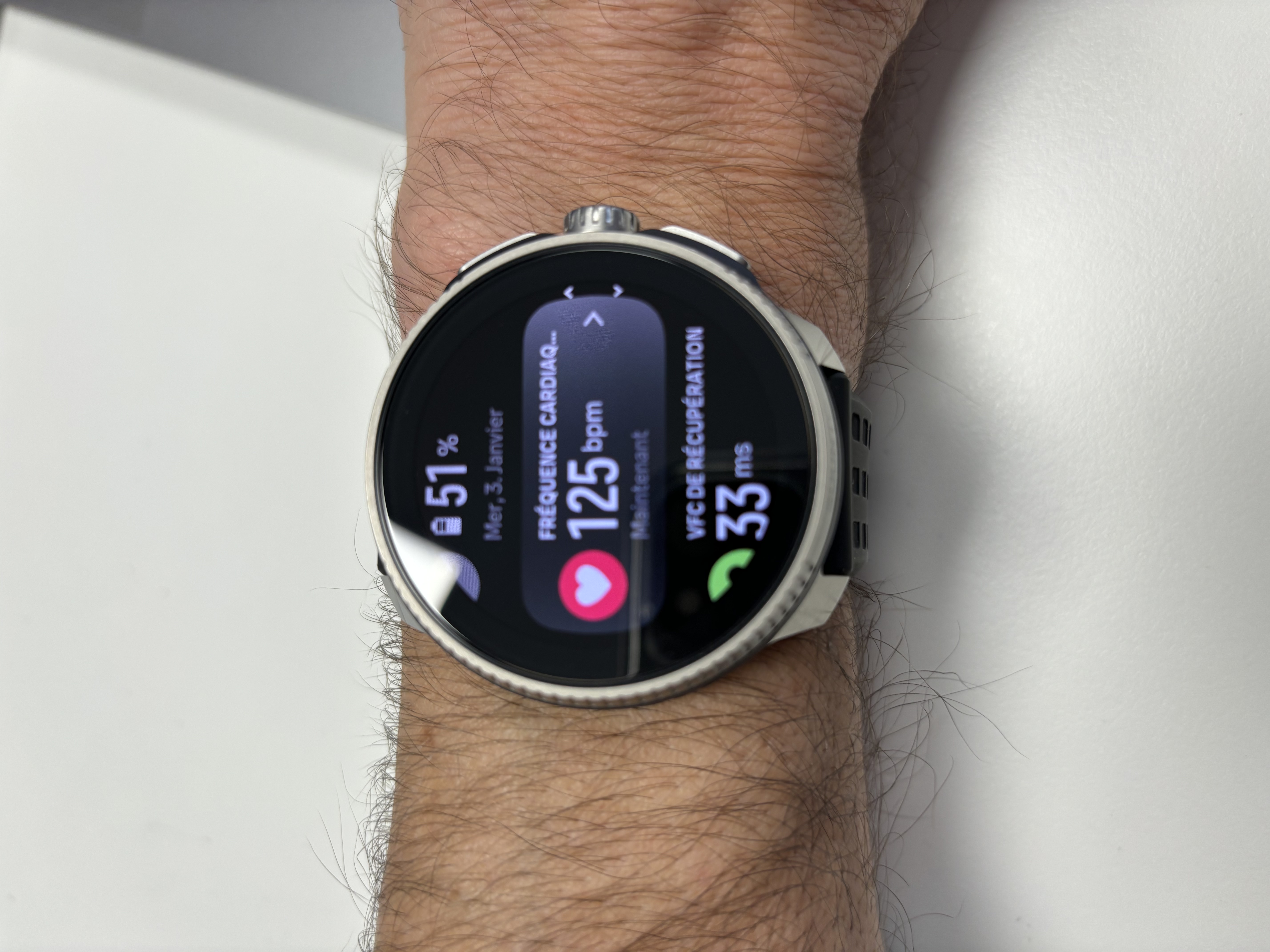
-
@Fizzgig said in New owner of Suunto Race - first feelings:
Hi Everyone
Practicing running, hiking, gravel and mountain biking, I have been using GPS watches for quite a few years now.
Fervent user of Garmin from the Fénix 3 to the Epix Ben 2 since the beginning with a 6 month infidelity with Coros following the breakdown of my last Epix.
I have always looked with interest at Suunto watches. First of all, I have always loved design but I had never taken the time to change my training and usage habitudes.
I was ready to take the plunge when the vertical was announced but not being able to create complex training sessions, I abstained.
The race arrived and so I gave in at the beginning of December 2023 with the aim of doing my 2024 sporting season with this watch on my wrist.
Since sleep and HRV tracking technology came out, I wear my watches 24 hours a day. (I replaced the watch to the other wrist when I stay at the office to let it rest)First of all, I immediately found the Suunto application very easy to use. The data is clear and easily usable, well done for the work! The sleep tracking worked well, the HRV too but it was always lower than on my other watches (Garmin 33 on average, for Suunto 48 and 46 for coros).
During my running training sessions, I missed the beeps announcing the change of sequence as well as the repetition number. For the rest, everything was ok except the heart rate sensor.
From the start, I encountered difficulties. He showed me completely crazy values during the day. The night and sitting at my desk without moving, the value was ok (between 45 and 55). On the other hand, when moving, it is impossible to stabilize it with peaks at 120bpm. For training and sporting activities, I wear a heart rate belt.
I tried everything, tightening the bracelet more (to the point of leaving a nice red mark), a soft reset, two contacts with the Suunto chat, nothing solved the problem.
This generated completely false energy expenditure and recovery values.The watch returned to the store and they replaced it with a new one: same problem with the sensor.
I made the decision to sell it with a strong feeling of disappointment.I don’t know what to do, continue with a new Vertical….
Here is my feedback from the Race.
I completely agree with your statements about the OHR… I had the vertical before the Race and the OHR behaviour is more or less the same (bad).
In my opinion you have two options: use a chest belt or move to Garmin again.
-
@Luis-Andés-Olmedo Used to have 9PP and the oHR never worked well for me. In November I bought the Suunto Race and recently gifted the 9PP to my brother. He said that the oHR doesn’t work well for him either. On my Race the oHR works even worse for me than the one of 9PP.
-
@Highlands as I mentioned in my previous post, it’s a matter of being aware that the optical heart rate (OHR) sensor on the vertical/race doesn’t work well. For whatever reason, SUUNTO has decided to include that sensor, and we as customers can decide whether it’s not important (currently, the other advantages of the Race outweigh the sensor’s malfunction for me, and I accept it) or if it is. It’s true that the watch calculates many metrics based on heart rate, so all of them will be inaccurate. If that is important to you, either use a chest strap or switch to another brand with a good OHR.
-
@Luis-Andés-Olmedo Agreed. I just wanted to mention here that I’m one of the users for whom the oHR doesn’t work well. Before I bought the SR I knew the sensor was the same, so I hadn’t had any positive expectations about it and still I bought the watch. More or less I like the watch. It’s a good product.
-
@Luis-Andés-Olmedo @Highlands fully agree with you.
I had no expectations on OHR except for daily and night tracking (where it works just fine).
Anyone who choose any brand with hight OHR expectations propably expose himself to high disappointment.
Even if OHR (of any brands) work sometimes “well” for some people, nobody that want to use HR for training should rely on OHR. It is never as precise as a chest strap, for now.
I find boring that we have all the time the same feedback about OHR that “doesn’t work well”.
But I guess it is the power of marketing that make us believe that OHR is “just greal all the time”… -
The reliability of cardiac sensors is known not to be “reliable” data, a small margin of error is considered acceptable. In this case, it’s a complete crash. The data communicated by the watch are all incorrect when considering the heart values. I like the design of Suunto, the application is great but I can’t spend 550 euros on a sports tool that gives totally crazy values. Reading all the reviews, everyone is unanimous with the race and the vertical (myself included) These are excellent watches but the sensor is frankly not up to par.
-
@Fizzgig you’re right, but not everybody has such trash values…also I have plenty of friends using other brands and very recent watches that have the same issues.
-
Probably Suunto’s ohr are not the best on the market, but I don’t think there are any reliable statistics that prove it.
-
I’m not a fan of OHR because when I’m cycling I want to have the watch attached to the handlebars and OHR is of no use. Likewise when kayaking, the watch is attached to the deck and I wouldn’t be able to read the values on my wrist. Hence the old SSU, where I have to and can use an external source for the heart rate.
Nevertheless, I have to say that I don’t have any problems with OHR with any current watch. Suunto Vertical, TicWatch Pro 5, Garmin Fenix 6X Pro, Huawei Watch GT Runner, Oppo Watch, all work for me under all circumstances (I don’t swim) as well as an external device (Polar Verity Sense, H10).
But only on my right wrist. I keep getting unrealistically high readings on my left wrist with all models. Suunto is no better and no worse, at least not for me.


-
@Fizzgig said in New owner of Suunto Race - first feelings:
The reliability of cardiac sensors is known not to be “reliable” data, a small margin of error is considered acceptable. In this case, it’s a complete crash. The data communicated by the watch are all incorrect when considering the heart values. I like the design of Suunto, the application is great but I can’t spend 550 euros on a sports tool that gives totally crazy values. Reading all the reviews, everyone is unanimous with the race and the vertical (myself included) These are excellent watches but the sensor is frankly not up to par.
Agree (although I did spend 400€ on the race
 ).
). -
@Fizzgig I have the same experience. Crazy spikes that I see at my desk or when making sudden movements. I’ve even had my Garmin 7X on the other wrist just to note my heart rate was normal.
-
@GiPFELKiND I do not know, it works very well for me. If there are tattoos or dark skin I think a problem as well. I have shaved the area around the watch and that seems to help. You need blood flow close to the skin for this to work. The measurement relies on blood flow.
-
@Fizzgig Your wrists are quite thin from the photo. The wristbone may interfere with the readings. You could try moving the position of the watch and see what happens. The reliability of the OHR will vary by individual and it does not matter the brand! My wife, who is very small cannot get an Apple Watch OHR to work either sitting or exercising, she uses a belt for exercising.
For me when exercising Suunto, Garmin are not good; Apple Watch Ultra is ok if low intensity. For not exercising Suunto, Garmin and Apple work equivalently.
I do think Suunto’s sensor is more sensitive to position and movement but I see reports from testers where it works well for some even exercising. I think one has to be careful to generalize quality based on a single individual and their experience. -
I tried a Garmin Forerunner 965 today in the same conditions as the Race. This is what the HR gives in the afternoon with two peaks going up the floors and the rest of the trips to site meetings at work. We also clearly see the return to seated calm at the end of the afternoon.
The data collected is overall much better and consistent.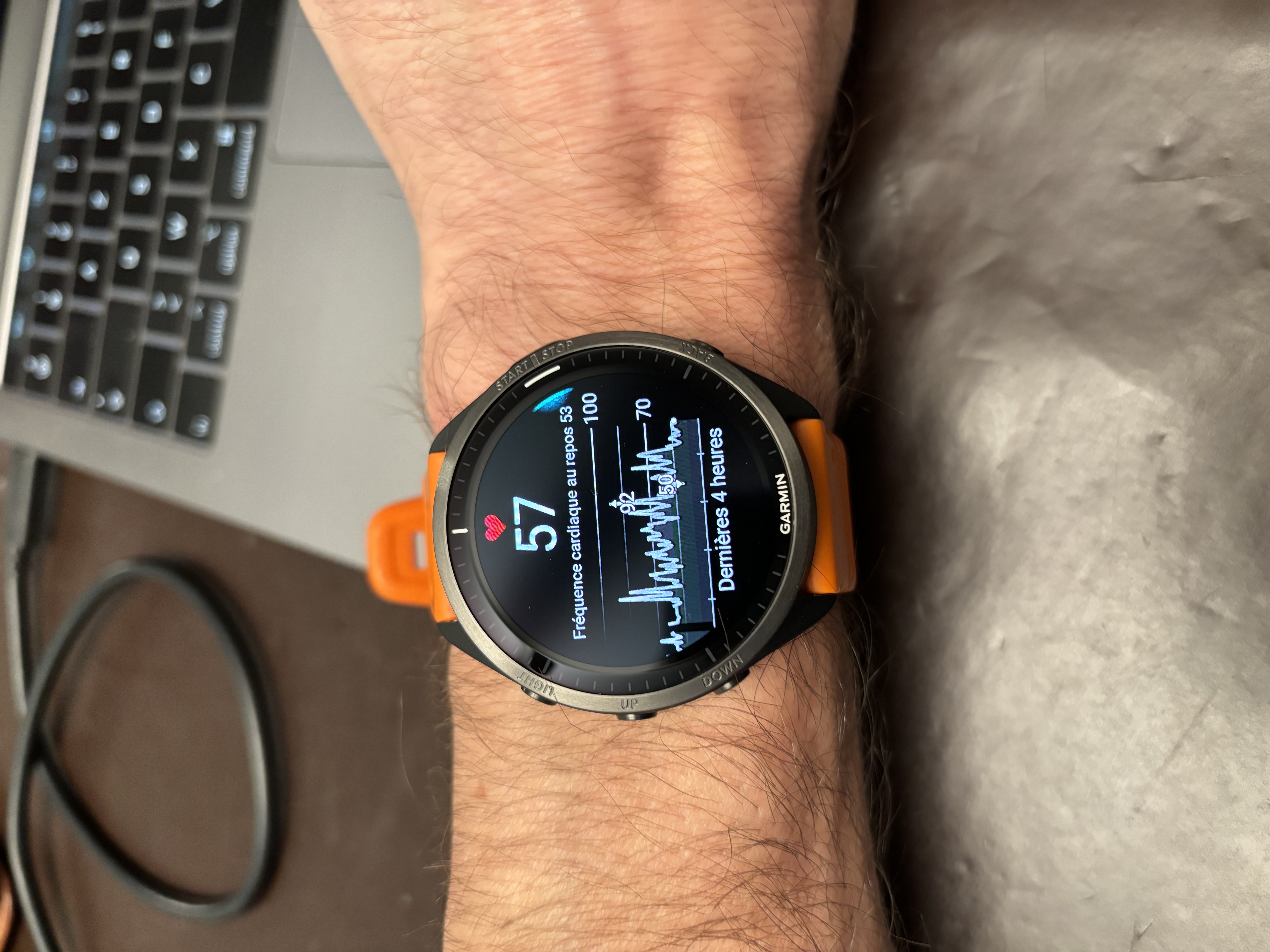
-
@Fizzgig As I said in my post, OHR will vary from individual to individual, just because one brand works for you does not mean it works for everyone. For me, Suunto 9PP and Garmin Epix gen 2 were about equal.
-
I wore 6 Garmin, 2 Coros (pace and vertix), Apple S5 and S8), a Fitbit bracelet and all measured accurately. It would still be strange if Suunto was not compatible with me…
Being on a dedicated Suunto forum, I suspect that a moderator will not recognize the failure of the HR sensor. I am still interested in a copy of your daily HR statement. With certainty, we will obtain the same uncontrolled variations. -
@Fizzgig Here is today, nothing unusual. Run in the morning has normal HR with belt. No spikes.
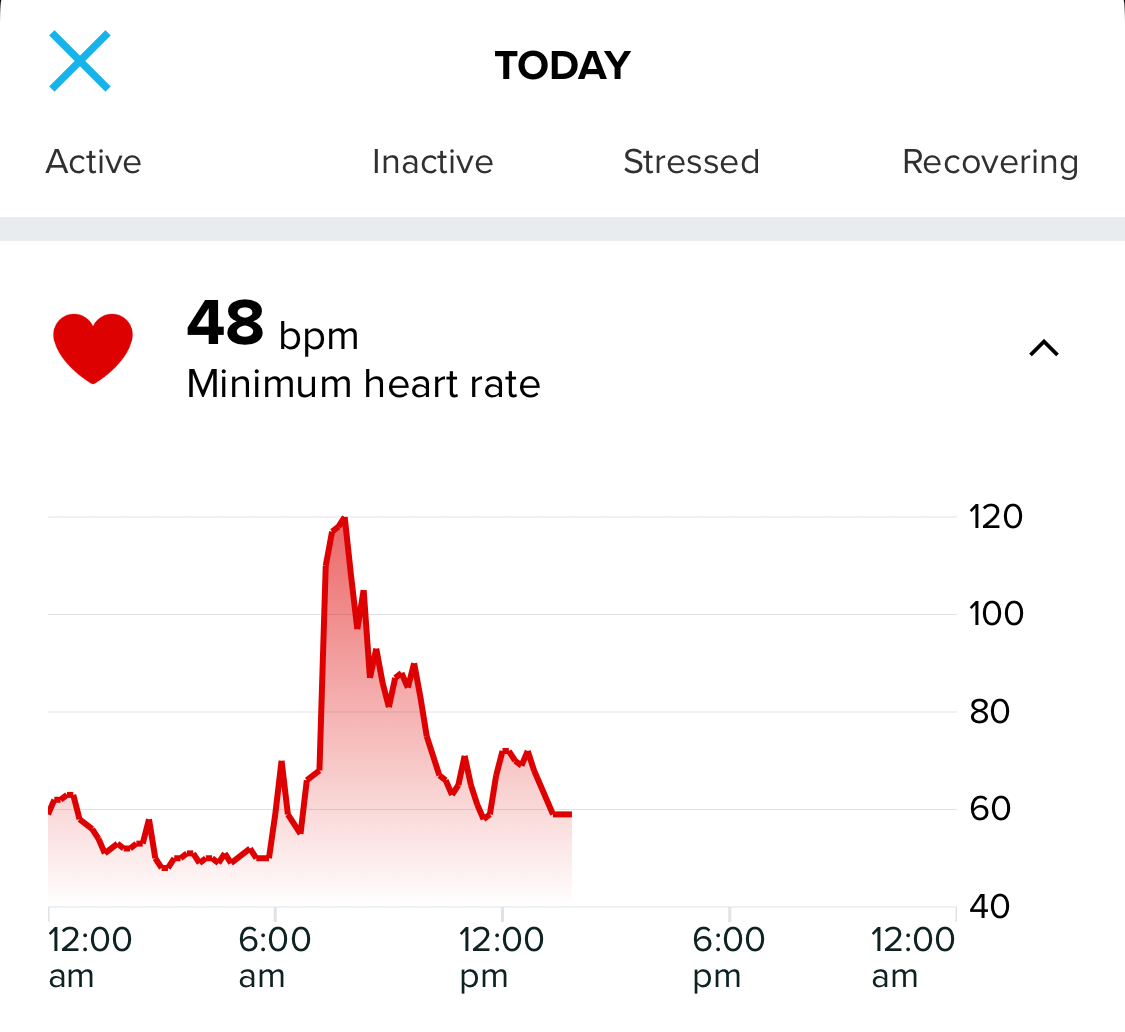
And the watch
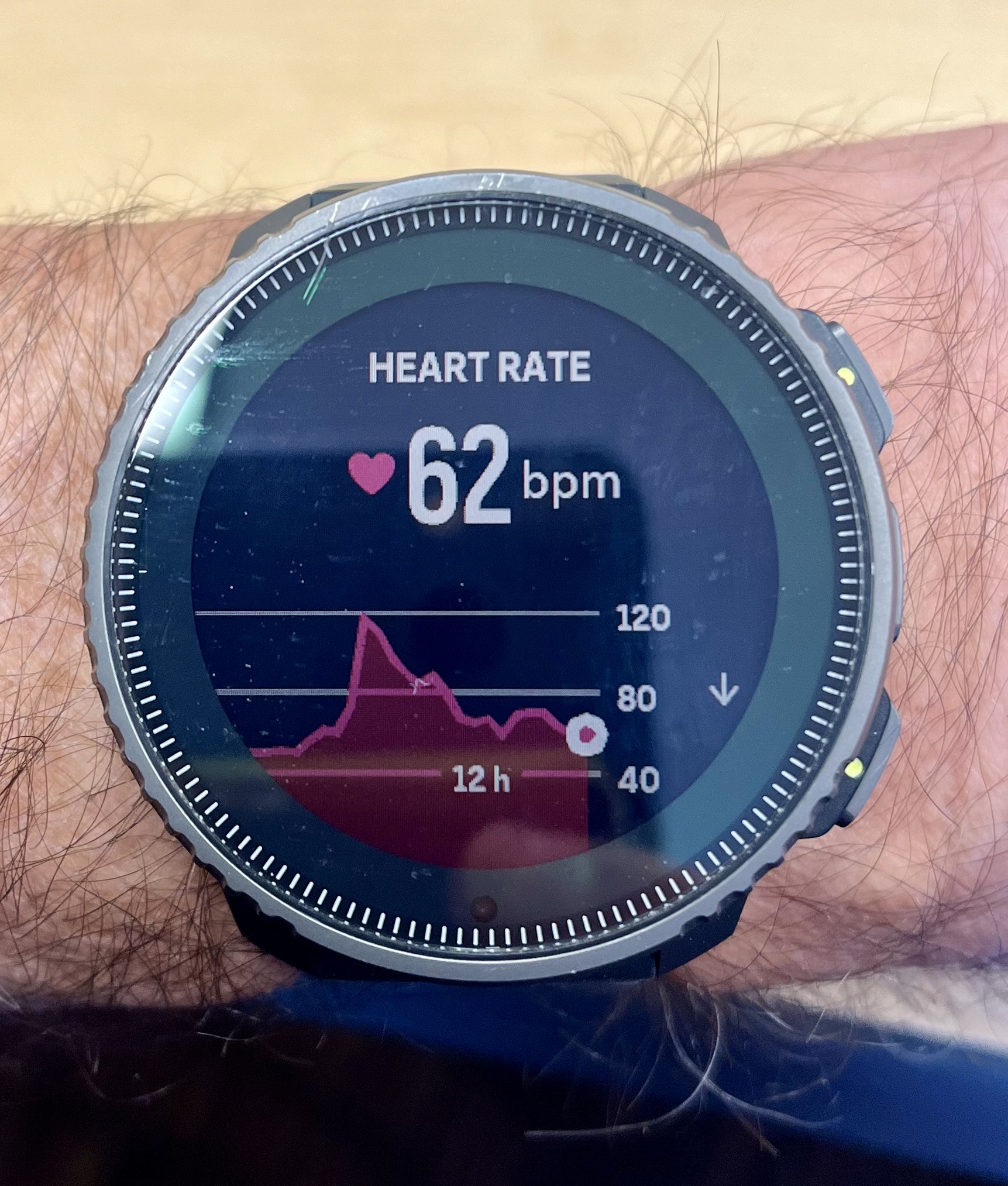
-
Thanks ! all the day with belt ? Or only the small running?
-
@Fizzgig only running for 45 minutes at 07:15 with belt